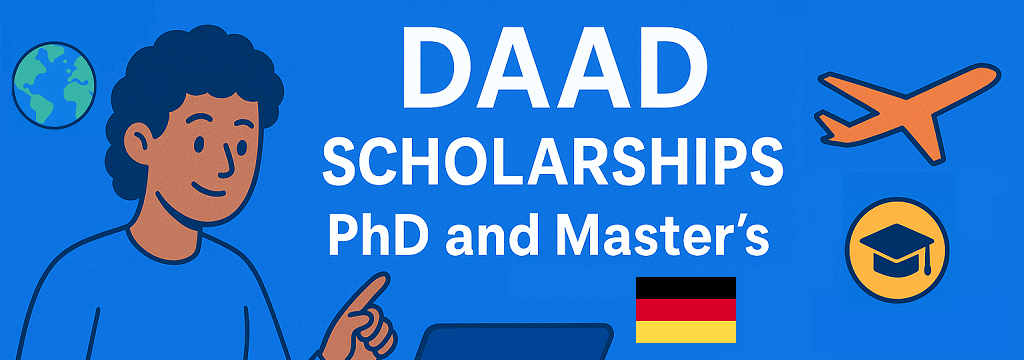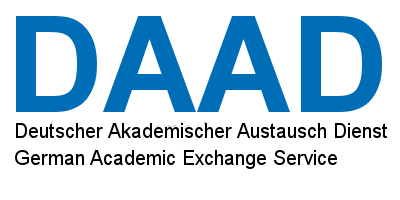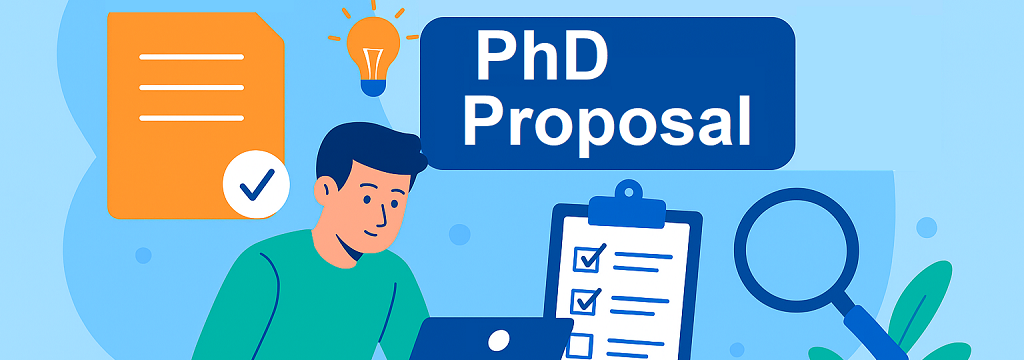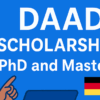
Many postgraduate students around the world actively search for DAAD scholarship PhD and master’s programs on the internet. In fact, the DAAD’s study scholarships and research grants support 100,000+ domestic and international master’s and PhD students, as well as postdoctoral researchers in Germany, making it the largest funding organization of its kind worldwide. DAAD scholarship PhD programs are among the most popular fully funded scholarships. DAAD scholarship master’s programs are as popular as Erasmus Mundus scholarships in the German funding landscape. These study and research scholarships cover a wide range of student-related costs, including living, health insurance, and travel expenses. This article explores everything you need to know about DAAD scholarship eligibility, benefits, and duration.
What is DAAD Scholarship?
The German Academic Exchange Service scholarships are widely known as DAAD scholarships among postgraduate students and postdoctoral researchers across the world. DAAD is the abbreviation for Deutscher Akademischer Austauschdienst, which is the German version of the German Academic Exchange Service. A variety of DAAD scholarship PhD and master’s programs are available, including the Study Scholarships – Master Studies for All Academic Disciplines, the Development-Related Postgraduate Courses (i.e., called DAAD EPOS), the Study Scholarships – Postgraduate Studies for Artistic Disciplines and Architecture, the Study Scholarships for STEM Disciplines, and the Research Grants – Doctoral Programs. The DAAD scholarship PhD and master’s opportunities are awarded to international advanced students for study and research visits to universities and non-university research institutes in Germany.
DAAD Scholarships Eligibility, Benefits, Duration
Nearly every subject/field/major is eligible for one of the many DAAD scholarship PhD and master’s programs, though there are some restrictions (such as in medicine). Additionally, there are subject-specific programs designed for specific fields, like computer science, music, or architecture. Candidates can search for programs that fit their subject group by using the scholarship database. Not every scholarship has a language proficiency requirement. However, specific language proficiency may be required based on the program and the applicant’s country of origin. The Call for Applications’ “Application requirements” and “Application documents” sections contain comprehensive details on these requirements.

Generally speaking, there is no DAAD scholarship eligibility age limit. Exceptions exist in certain programs where this is explicitly required by an international partner. The majority of scholarships stipulate that the last degree must have been earned no more than a certain amount of time ago. Even if you started your PhD or finished your degree later than the requirements permit, you might still be eligible in the following situations that could postpone your academic progress:
- pregnancy and childbirth
- care of children up to the age of 12 (maximum of three years per child)
- care of care-dependent relatives
- disability or chronic illness
- prolonged, serious illness
- compulsory military service
- if applicable, other circumstances.
The application form’s final free text field, “Other comments / Information“, can be used to include information about the dates of the children’s births, long periods of absence due to illness or disability, and periods of childcare or care of family members. A DAAD scholarship PhD/master’s program has the right to request that you provide the necessary supporting documentation. Generally, the DAAD scholarship monthly stipend amount is €992 per month for 1-2 years for master’s students and €1,400 for 3-4 years for PhD candidates. Other benefits are health, accident, and liability insurance, as well as travel costs. Let’s explore three of them together:
DAAD Study Scholarships – Master’s Studies for All Disciplines
The DAAD Study Scholarships – Master Studies for All Academic Disciplines offer international students the chance to get Germany funding, supported by the German Federal Foreign Office. Eligible applicants must have completed their first degree (Bachelor’s or equivalent) before the funding begins. The program supports either a full Master’s degree at a recognized German university or one academic year in Germany as part of a Master’s program in the applicant’s home country, provided credits are transferable.
DAAD Study Scholarship Master’s Duration & Benefits
These DAAD master’s scholarships last 10–24 months, covering a stipend of €992 per month, insurance, travel costs, and an annual study allowance. Additional support may include rent subsidies, family allowances, or disability-related expenses. To prepare students for academic life in Germany, the DAAD funds online and in-person German language courses, reimbursement for TestDaF or DSH exams, and, in some cases, compulsory pre-study language training. Tuition fees are not covered by DAAD scholarships.
DAAD Scholarship Selection Criteria for Master’s
Selection is carried out by an independent committee of academic experts, based on three main factors: the applicant’s academic qualifications, the quality and feasibility of the proposed study project, and the applicant’s potential. Motivation, career prospects, language skills, and extracurricular commitment are all considered. Equal opportunity factors are also taken into account. Successful candidates demonstrate strong academic performance and a clear vision of how studying in Germany supports their long-term goals.
DAAD EPOS Scholarship: Fields, Deadlines & Benefits
The DAAD EPOS Scholarship funds master’s and PhD (in exceptional cases) programs in Germany at state-recognized universities, lasting 12 to 42 months depending on the course. The scholarship covers monthly stipends (€992 for graduates, €1,300–€1,400 for doctoral candidates), health, accident, and liability insurance, and travel costs, with possible rent and family allowances. Applicants must hold a relevant bachelor’s degree, demonstrate strong academic performance, and show motivation for development-related work. The program aims to train local experts, foster international collaboration, and contribute to sustainable development worldwide.
Which Nationalities Can Apply for EPOS DAAD Scholarship?
The EPOS DAAD scholarship PhD and master’s programs support highly qualified graduates from the following developing and newly industrialized countries who have at least two years of professional experience:
Africa (North Africa and Sub-Saharan Africa): Algeria, Egypt, Libya, Morocco, Tunisia, Angola, Benin, Botswana, Burkina Faso, Burundi, Cameroon, Cabo Verde, Central African Republic, Chad, Comoros, Congo, Dem. Rep. Congo, Côte d’Ivoire, Djibouti, Equatorial Guinea, Eritrea, Eswatini, Ethiopia, Gabon, Gambia, Ghana, Guinea, Guinea-Bissau, Kenya, Lesotho, Liberia, Madagascar, Malawi, Mali, Mauritania, Mauritius, Mozambique, Namibia, Niger, Nigeria, Rwanda, Sâo Tomé and Principe, Senegal, Sierra Leone, Somalia, South Africa, South Sudan, Saint Helena, Sudan, Tanzania, Togo, Uganda, Zambia, and Zimbabwe.
America (North, Central, and South America): Belize, Costa Rica, Cuba, Dominica, Dominican Republic, El Salvador, Grenada, Guatemala, Haiti, Honduras, Jamaica, Mexico, Montserrat, Nicaragua, Panama, Saint Lucia, Saint Vincent & the Grenadines, Argentina, Bolivia, Brazil, Colombia, Ecuador, Guyana, Paraguay, Peru, Suriname, and Venezuela.
Asia (Middle East, South Asia, Central Asia, and East Asia): Iraq, Iran, Jordan, Lebanon, Palestinian territories, Syria, Yemen, Afghanistan, Armenia, Azerbaijan, Bangladesh, Bhutan, Georgia, India, Kazakhstan, Kyrgyzstan, Maldives, Myanmar, Nepal, Pakistan, Sri Lanka, Tajikistan, Turkmenistan, Uzbekistan, Cambodia, China, Indonesia, South Korea, Lao, Malaysia, Mongolia, Philippines, Thailand, Timor-Leste, and Vietnam.
Europe: Albania, Belarus, the Republic of Moldova, and Ukraine.
Oceania: Fiji, Kiribati, Marshall Islands, Micronesia, Nauru, Niue, Papua New Guinea, Samoa, Solomon Islands, Tokelau, Tonga, Tuvalu, Vanuatu, and Wallis & Futuna.
EPOS DAAD Scholarship: Fields and Deadlines
It covers a wide range of majors and fields in Economic & Political Sciences, Engineering & Related Sciences, Urban Planning, Agriculture, Natural Sciences, Environmental Sciences, Medicine, and many others. These are provided through many universities in Germany (and taught in English), including the Technical University of Dresden (TU Dresden), University of Leipzig, TU Darmstadt, TU Berlin, and many others, and their application processes are administered through these universities’ application systems. Therefore, you should check each university’s website or this link for the EPOS scholarship application deadline, which varies by field and degree level (master’s or PhD). You may read everything about this scholarship in a PDF file located at the end of this article.
DAAD Scholarship PhD Programs: Overview
DAAD Scholarship PhD Programs: Eligibility and Selection Process
The DAAD Doctoral Programs enable international PhD applicants to pursue a fully funded PhD in Germany, supported by the German Federal Foreign Office. Applicants must hold a Master’s Degree, or in exceptional cases a Bachelor’s degree, with strong academic achievements. Funding is available for both individual PhD projects supervised by a professor and structured doctoral study programs at state-recognized universities or non-university research institutes. Research phases outside Germany are also possible if essential, but limited to one quarter of the funding period. Selection is conducted by an independent committee of scientists, based on academic qualifications, PhD research proposal quality, and the applicant’s potential for academic and professional growth. Motivation, feasibility, and long-term development goals are critical factors for success.
DAAD Scholarship PhD Programs: Benefits and Duration
This DAAD PhD scholarship provides a monthly stipend of €1,400, health and liability insurance coverage, travel allowance, and an annual research grant of €460. Additional benefits include rent subsidies, family allowances, and support for students with disabilities or chronic illnesses. DAAD also funds language preparation through online and in-person courses, along with reimbursement for TestDaF or DSH exams. The scholarship runs for up to four years, with initial grants of three years and possible extension into a fourth year. Your academic achievements will be assessed annually, and if you can demonstrate that you will complete your doctorate within a reasonable period of time, the DAAD PhD scholarship will continue as planned.
Conclusion
The DAAD scholarship PhD and master’s programs represent one of the most comprehensive Germany funding opportunities for international students and researchers. With support from the German Federal Foreign Office, these scholarships cover essential costs such as living expenses, health insurance, and travel, while also offering valuable benefits like language courses and family allowances. Whether pursuing a master’s degree, joining the DAAD EPOS Scholarship, or undertaking a full doctoral project, candidates gain access to world-class education and research opportunities in Germany. By supporting academic excellence and global collaboration, the DAAD scholarship for PhD and master’s students strengthens professional development and contributes to international knowledge exchange.
Frequently Asked Questions (FAQs)
What is the DAAD scholarship for PhD students?
The DAAD scholarship for PhD students funds doctoral research in Germany, covering stipends, insurance, and research allowances for up to four years.
Who can apply for a DAAD scholarship PhD program?
Applicants with a Master’s degree (or exceptional Bachelor’s degree) and strong academic records are eligible for DAAD scholarship PhD programs.
Is there an age limit for DAAD Scholarship PhD and Master’s programs?
No, there is usually no strict DAAD scholarship eligibility age limit. However, most scholarship programs require that only a limited period has passed since the completion of the last degree.
Does DAAD Germany funding cover tuition fees?
No, DAAD scholarship PhD and master’s programs do not cover tuition fees, but they fund living costs, insurance, travel, and language preparation. Don’t worry, even if there is a tuition fee for a German university, it is usually very cheap.
Can research outside Germany be funded under the DAAD scholarship PhD?
Yes, DAAD may fund research phases outside Germany if essential, but these cannot exceed one-quarter of the total funding period.





Leave Your Comment